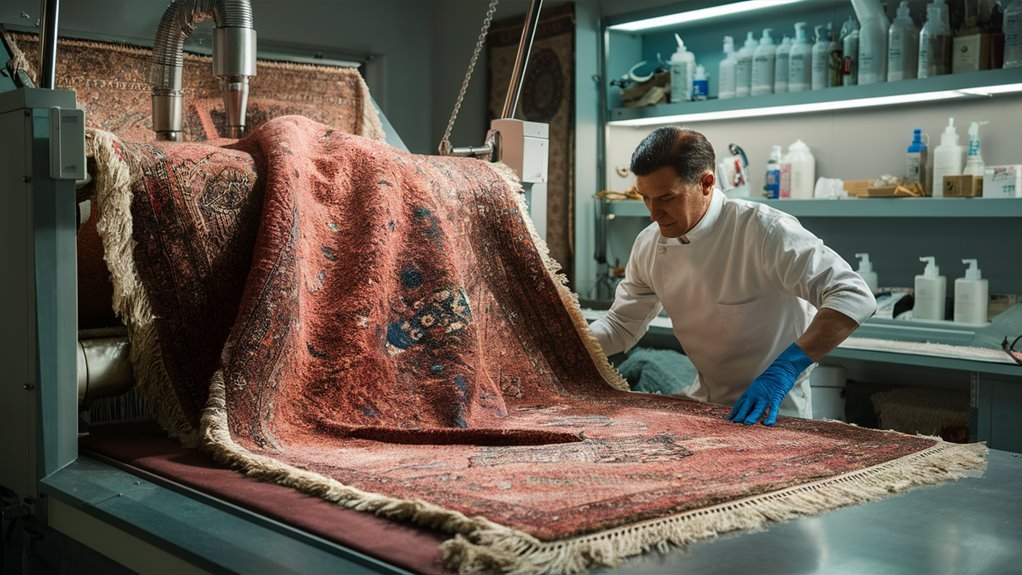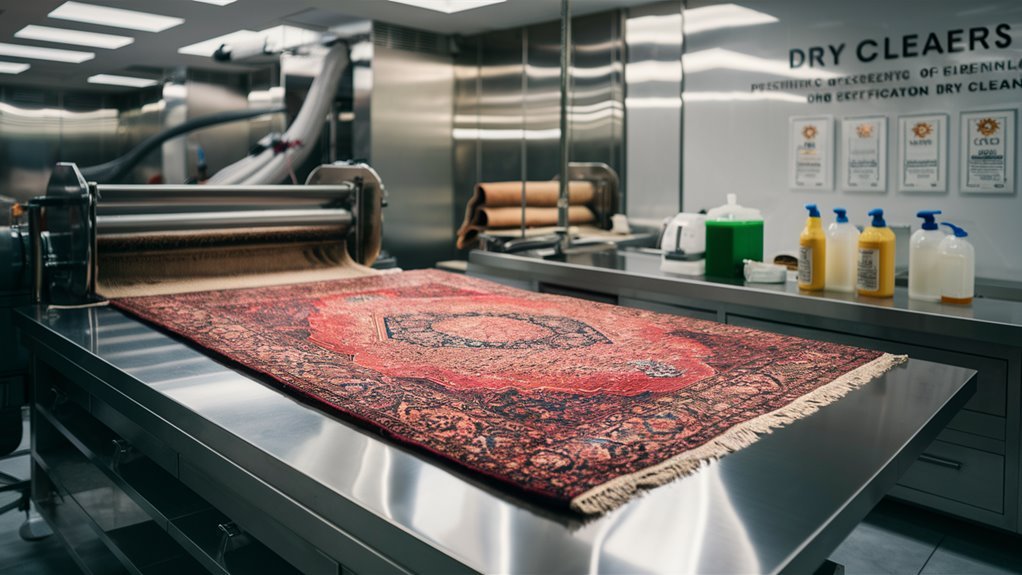Yes, dry cleaners can clean rugs, especially delicate, non-water-resistant types like Oriental or antique rugs. These require special techniques, using absorbent pads and dry foam to remove dirt while preserving their texture and colours. First, professionals inspect the rug to identify stains and determine the best cleaning method. Regular vacuuming prepares the rug by removing surface dirt, allowing for a more effective deeper clean. If you're worried about colour running or shrinkage, dry cleaning is a gentle alternative. You should consider professional rug cleaning annually, spot cleaning spills immediately, and ensuring compatibility with eco-friendly solutions for safe care. Uncover more insights.
When it comes to your cherished rugs, especially those made from delicate materials, understanding the dry cleaning process is vital. The dry cleaning method is ideal for cleaning rugs that are delicate or non-water resistant, like Oriental or antique pieces. This process uses specialised cleaning solutions and equipment—such as absorbent pads or dry foam—to remove dirt and stains effectively without water.
Before starting the rug dry cleaning, a professional dry cleaning service thoroughly inspects your rug. This initial inspection identifies stains and determines the best cleaning method based on the rug's material and condition.
Professional dry cleaners are skilled in recognising different types of rugs and applying suitable techniques. They guarantee the best cleaning results while maintaining the integrity of your rug's fibres. This expertise is significant, as using inappropriate cleaning methods can damage delicate rugs.
The cost for dry cleaning rugs typically ranges from £100 to £200, influenced by the rug's size, material, and unique features requiring extra care. By opting for a professional rug cleaning service, you can rest assured that your delicate rugs are in capable hands and will be cleaned with the utmost care and precision.
Understanding the dry cleaning process for rugs is vital, but it's just as important to distinguish it from garment cleaning. Rugs often require specialised techniques and equipment tailored to their unique materials and construction.
Unlike garments, which primarily focus on fabrics used in clothing, rugs can absorb considerably more water. This means a dry cleaning approach is often necessary for delicate or water-sensitive types of rugs to prevent damage and guarantee they're thoroughly cleaned.
The dry cleaning solution used for rugs is specifically formulated to avoid colour running and shrinkage, critical for intricate designs and natural fibres.
The cleaning process for rugs typically involves thorough dust removal and a different application of cleaning agents compared to the straightforward washing methods used for clothing.
Professional rug cleaners possess extensive training in recognising various rug materials and stains. This expertise sets them apart from standard local dry cleaners who mightn't have the same level of knowledge.
When seeking "rug cleaning near me" or the "Best Rug Cleaning" service, consider the professional rug cleaner's experience with different types of rugs and their ability to remove dirt and grime effectively.
This guarantees your rugs receive the care they deserve.

Dry cleaning is a preferred method for maintaining delicate rugs, especially those made from natural fibres like Oriental and Persian rugs. These rugs require careful handling to avoid damage.
Dry cleaning is suitable as it preserves the intricate designs and materials commonly found in antique rugs made from wool or silk. If your rug features vibrant dyes or intricate colour patterns, dry cleaning prevents colour running, which can occur with traditional washing methods that involve water.
When dealing with synthetic rugs, check whether they're labelled as non-water resistant. Such rugs may require dry cleaning to maintain their appearance and integrity.
Regular dry cleaning is additionally recommended for rugs that experience heavy foot traffic or are prone to stubborn stains. These conditions can cause significant wear and tear, and dry cleaning helps keep them looking their best.
If you're uncertain whether your rug should be dry cleaned, consider the material and usage. Delicate rugs, particularly those made from natural fibres like wool or silk, and synthetic rugs labelled as non-water resistant, are ideal candidates.
This method guarantees that your rugs maintain their beauty and durability over time, without the risks associated with traditional cleaning.
Among the various methods available, absorbent pad dry cleaning stands out as a popular technique for cleaning rugs. It involves using a machine outfitted with absorbent pads. These pads agitate the rug while injecting a cleaning solution to lift dirt and grime. This method is especially effective for quick clean-ups and maintaining the rug's appearance between professional cleanings.
Another common technique is dry foam dry cleaning. This method applies a dry foam detergent directly onto the rug. The foam breaks up dirt and stains before being vacuumed away. It's particularly effective for heavy dirt and stubborn stains on various rug types.
First, always have your rug cleaner vacuum the rug thoroughly to remove surface dirt and dust. This step guarantees the cleaning solutions can penetrate deeper for a more thorough clean.
Professionals often test a hidden area of your rug with the cleaning solution. This guarantees compatibility and prevents potential damage. Specialised equipment and chemicals are utilised to maintain the integrity of delicate fabrics, assuring a gentle yet effective cleaning approach.
While steam cleaning is another option, dry cleaning services offer a viable alternative for those seeking less water-intensive methods.

When considering rug dry cleaning, you'll find both benefits and drawbacks to weigh. This method is gentle on rugs, minimising damage compared to water-based techniques. Rug dry cleaners use processes that clean without harsh chemicals, so delicate materials are safer.
When deep cleaning is done, it effectively removes deep-set dirt and most stains while preserving the rug's color and texture. Nevertheless, stubborn stains might linger, possibly requiring special follow-up cleaning.
The cost is another factor; expect to pay between £100 to £200, depending on rug size and type. Intricate designs, which require special care, can increase expenses. In spite of the cost, the best results often justify the investment, especially for valuable or delicate rugs.
Scheduling can be tricky, too. Rug dry cleaners may need advanced booking as availability varies, and the process can be time-consuming.
To guarantee your rug is cleaned properly, hire a team of experts who understand your rug's specific needs. They can assess and decide the best approach, balancing efficiency with careful handling.
While dry cleaning has its pros and cons, considering these factors helps make a well-informed choice. The dry cleaning process for delicate fabrics is essential to maintain their quality and appearance. Choosing a reputable service that specializes in this process can prevent damage that might occur with standard washing methods. With proper care, your favorite garments can last longer and look their best.
Finding a rug dry cleaning service that suits your needs involves a bit of research and careful consideration. Look for companies that offer a variety of cleaning techniques and have a solid reputation for quality. Reading reviews and asking for recommendations from friends or family can also help narrow down your options. Ultimately, prioritizing professional dry cleaning services that use eco-friendly products and have experienced staff will ensure your rugs receive the best care possible.
Start by looking for companies with expertise in rug cleaning, particularly those experienced with different rug types like Oriental or Persian. It's essential to guarantee they use Prochem certified cleaning solutions—these are safe and effective for cleaning your rug without harming its fibres.
In cities like London, many services offer convenient collection and delivery options.
When considering Rug Cleaning London providers, check if they provide a complimentary home viewing service. This allows professionals to assess your rug's condition and suggest the best cleaning method—sometimes a full dry cleaned process isn't necessary, and a simple spot clean might suffice.
Read customer reviews to gauge reputation and reliability. A service that's highly recommended will often have numerous positive testimonials.
Additionally, check their scheduling flexibility. Some companies offer same-day or weekend cleaning, which is helpful for urgent situations.
While selecting the right dry cleaning service is important, exploring alternatives can also provide effective solutions for maintaining your rugs. Different types of cleaning methods cater to various needs and rug materials. Steam cleaning uses hot water extraction, which is a great cleaner for removing deep-seated dirt without harsh chemicals. Regular vacuuming is vital to keep your rugs fresh, while spot cleaning with a mild detergent helps tackle minor stains between professional cleanings.
For those seeking eco-friendly options, professional services often use biodegradable solutions that are safe for both your rug and the environment. Hand washing is suitable for some synthetic rugs, using gentle detergents and minimal water to avoid damage. Absorbent pad cleaning, which uses a pad to lift dirt, is perfect for delicate or antique rugs.
Here's a quick comparison of these methods:
| Method | Best For |
|---|---|
| Steam Cleaning | Deep-seated dirt, eco-friendly |
| Regular Vacuuming | Day-to-day maintenance |
| Spot Cleaning | Minor stains |
| Hand Washing | Synthetic materials |
| Absorbent Pad Cleaning | Delicate or antique rugs |
You might wonder if a dry cleaner will wash a rug. They can clean certain types, especially delicate ones, using specialised methods. Always check with them to verify your rug's material is suitable for dry cleaning.
You should definitely clean your rug. Regular cleaning extends its lifespan, preserves its beauty, and prevents costly replacements. Professional services handle delicate fabrics well, making the investment worthwhile. Immediate spill clean-up is vital to avoid permanent stains.
You should vacuum your rug weekly and spot clean stains with a damp cloth and mild soap immediately. For delicate or natural fibre rugs, schedule professional cleaning every 6-12 months to maintain quality and longevity.
You should choose dry cleaning for delicate rugs like Oriental or Persian to avoid damage. Opt for steam cleaning when dealing with heavily soiled carpets that can withstand high-pressure hot water for deep cleaning and odour removal.
When deciding to clean your rug, consider dry cleaning if it's made of delicate materials. Dry cleaners use special solvents instead of water, preventing damage. Nevertheless, not all rugs are suitable for this method. Always check the rug's label first. If dry cleaning isn't an option, consider alternatives like professional steam cleaning or spot cleaning with mild detergent. Choose a reputable service by checking reviews and asking about their cleaning techniques to guarantee your rug's safety and cleanliness.
